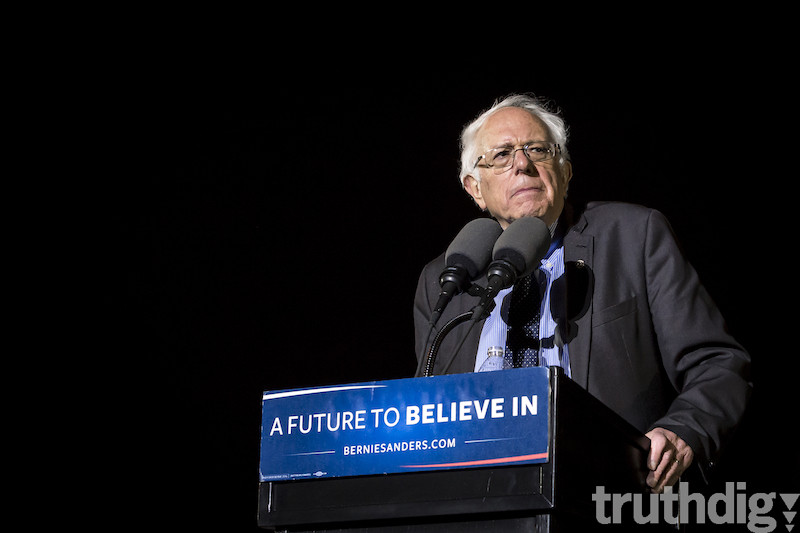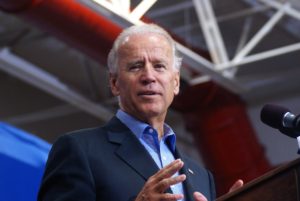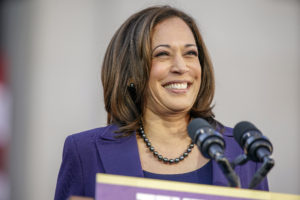Sanders Set to Mount Vigorous Defense of ‘Medicare for All’
The presidential candidate is expected to hit back at his critics who say his signature proposal amounts to both bad politics and bad policy. Michael Nigro / Truthdig
Michael Nigro / Truthdig
WASHINGTON — Bernie Sanders will vigorously defend his signature “Medicare for All” proposal on Wednesday and hit back at his critics who say his push amounts to both bad politics and bad policy.
The Vermont senator also will pledge to reject campaign donations from health insurance and pharmaceutical industry executives, lobbyists and political action committees and will challenge other Democratic presidential candidates to do the same.
He’ll deliver a speech at George Washington University as the fight over how to best provide health care for Americans becomes an animating focus of the race for the 2020 Democratic presidential nomination.
“You can’t change a corrupt system by taking its money,” Sanders will say, according to prepared remarks.
Sanders and former Vice President Joe Biden have been engaged in an increasingly bitter dispute over Medicare for All. Wednesday’s speech could further escalate tensions between the two campaigns, which have pointedly engaged each other in recent days.
During a live-streamed discussion on Tuesday, Sanders dismissed Biden’s criticisms of Medicare for All and said the nation should have “a health care debate on the facts and not on fear-mongering.”
“Medicare is a popular, well established program,” he said. “All that we are doing, despite all that the health care industry is going to expend trying to lie about what we’re doing, what my opponents will talk about, all we’re doing is expanding Medicare. Not so radical really, after all.”
Slipping in some public polling and outraised by some of his 2020 opponents, Sanders has been increasingly willing to go on the offense against Biden on the issue of health care, one that has sharply divided Democrats. Sanders’ campaign says that in the speech he will “confront the Democratic opponents of Medicare for All and directly challenge the insurance and drug industry” and will make the case that Medicare for All “is the only way to fix our broken health care system.”
On Monday, Biden released a proposal to expand the Affordable Care Act, warning that it would be dangerous to eliminate it and replace it with Medicare for All. Biden’s proposal would create a public option that would allow people to sign up for a government-run health system like Medicare if they were unhappy with private insurance.
This week in Iowa, where Biden pitched his plan to voters, he cautioned that a sudden transition of tens of millions of people to Medicare for All was “a little risky.”
“Medicare goes away as you know it. All the Medicare you have is gone. It’s a new Medicare system,” Biden said at a presidential candidate forum held by the AARP. “It may be as good, you may like it as well, it may or may not, but the transition of dropping 300 million people on a totally new plan, I think is a little risky at this point.”
He also raised the prospect that some people could see temporary gaps in coverage, a notion that Sanders has bristled at and called “obviously absurd.”
On Tuesday, Sanders said the plan that Biden has pitched did not go far enough in ensuring that Americans have the coverage they need.
“I have helped write and defended the Affordable Care Act,” Sanders said during an interview with The Washington Post, which was live-streamed. “But you know what? Times change, and we have got to go further.”
Nine years after the Affordable Care Act was passed under the Obama administration, Americans are still more likely to support than oppose the law, 48% to 30%, according to an April poll from The Associated Press-NORC Center for Public Affairs Research , though a sizable share doesn’t take either side. Views of a single-payer health care system, in which all Americans would get their insurance from one government plan, are mixed: More Americans favor than oppose single-payer, 42% to 31%, and an additional 25% say they hold neither opinion. The public is even more supportive of a government health insurance plan that can be bought instead of a private insurance plan: 53% express support, compared with just 17% who oppose; 29% are neither in favor nor opposed.
The roaring health care debate also is likely to further draw in the full Democratic field. Several other leading 2020 candidates, including California Sen. Kamala Harris and Massachusetts Sen. Elizabeth Warren, support Medicare for All. However, some other Democratic hopefuls have warned that the party is moving too far left and have supported a more centrist approach.
Among them is Colorado Sen. Michael Bennet, who has been sharply critical of Medicare for All, instead preferring a public option for health coverage that could be included in the current structure of the Affordable Care Act.
In an interview with The Associated Press as he campaigned in Iowa, Bennet said that Democrats would “never unify around Medicare for All” but that plans like his, which would create a public option but allow people to keep their private health insurance, could bring Democrats together and notch wins in states like Colorado.
“If you’re gonna stand up and commit the Democratic Party to taking away from 180 million people, you’d better be clear on what the nuances are because when you’re running against Donald Trump, it’s going to be too late,” he said. “You may think you can get away with it in the Democratic primary. You will not be able to get away with it running against Donald Trump.”
___
Associated Press writers Elana Schor and Hannah Fingerhut in Washington contributed to this report.
Your support matters…Independent journalism is under threat and overshadowed by heavily funded mainstream media.
You can help level the playing field. Become a member.
Your tax-deductible contribution keeps us digging beneath the headlines to give you thought-provoking, investigative reporting and analysis that unearths what's really happening- without compromise.
Give today to support our courageous, independent journalists.






You need to be a supporter to comment.
There are currently no responses to this article.
Be the first to respond.